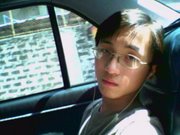As my dear friend, Walter, would say, "A crap load of" .... FUKIEN!!!!!!!!!!!!
I love that language. Despite that, listening to my 二姨丈 (di yi tniu) speak about Fukien makes me feel horrible about how much Fukien I speak. As my dad said, he speaks with the "authentic
廈門 EMeng accent". His life has been very interesting. Very much like a movie, my dad also says.
He was first born and raised in China, xiamen. His Fukien is therefore, perfect. Then at the age of twelve, right at the time the Communists swarmed into China, he had to use his smarts to escape, and he landed in Hong Kong.
From High School onward, he had to learn to speak Cantonese, because the Hong Kongers apparently hadn't heard of Fukien at the time.
There, he started writing to those columnist people, and every week, his letters'd get published. He talked about a wide variety of topics that appealed to readers so much so that even when he'd left for The Philippines (streaming nationalistic music here), they asked him to send letters there for their columns.
Interesting. Also: for the policemen, if the cloth thingies on their shoulders are black, then they speak only Cantonese. If they are RED, then they speak English. Something the British left behind. Apparently, in Hong Kong, when applying to be a policeman, being able to speak more than one language lands you an automatic commission in salary. But you HAVE to be able to speak Cantonese.
Anyway, sadly, my 二姨丈 no longer speaks Cantonese (he hasn't in fifty years... so you can just imagine how old he is now. But his mind is quick as a bee). His Fukien, probably from influence from a bunch of other dialects, is now extremely deep. He's the only person that I can't understand when he talks. He says things that I can't quite catch, and I need to listen into it, or think hard to understand. I wanna be like that some day.
He also said that Fukien is, according to the scholars that performed a study all over China, the hardest dialect to speak. I'm glad that 二姨丈 is aware that Fukien has 8 tones. So we can tell if someone is native Fukien or not, because when he speaks, it's 無準 bo zun--not accurate or precise.
Anyway, I borrowed Dad's P800 (Sony Ericsson please) and opened the Jotter. Then I proceeded to scribble characters and ask 二姨丈 how to read them in Fukien.
Some examples:
正確 zieng khak
知識 ti siak
紅塵 ang tin
準備 zun bi
這樣 zit yniu
接受 ziap siu
雨 ho/wu
語言 gi gian
伊人 yi din
候 hio
後 au/hio
若 diok
起家 khi ke
走私 zau si
趣味 cu bi
有 wu/iyu
月 ge*/guat
亮 niu/diong
合約 hap iyok
場所 tniu so
所在 so zai
地方 dei hong
服務員 hok gu guan
習慣 sip kuan
互相 ho siong
司機 si ki
沉默 tin biak
Earlier that day.... at lunch, I'd discovered something which my parents said to my brother. Yeah, Fukien has its own versions of chengyu 成語's.
偷工減料 thau kang kiam diao
According to NJ Star: To do shoddy work and use inferior material
And then in Hoisaan...
亂講 lon gong -- to talk nonsense
But because I didn't know that lon and lun were different in Hoisaan (in Cantonese, gong ang gung are practically the same when spoken fast), I pronounced it as lun gong...
So dad thought I said 輪缸, which is literally a wheel-shaped [water] jar.
I love Chinese.
Sunday, July 16, 2006
Subscribe to:
Post Comments (Atom)

2 comments:
乱讲 isn't unique to taishanese
Oh really? Cool...
Post a Comment